Internship “opens eyes” of students to the disease that racked their families
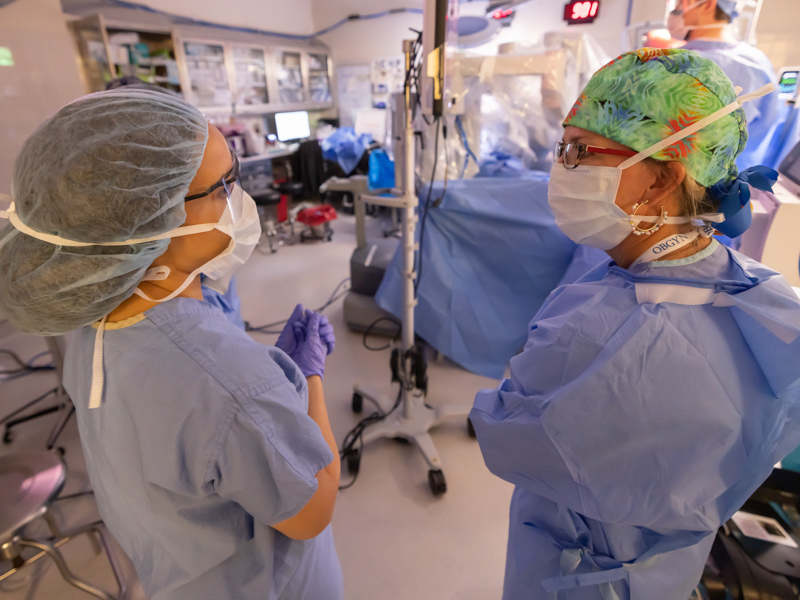
Cancer stole the life of Daja Martin’s mom, Kenya Ashby’s grandmother, Kayla Beamon’s grandmother, Jessica McKenzie’s grandmother, and three of Jayla Mondy’s grandparents, along with her cousin and friend.
These five University of Mississippi Medical Center medical students have something else in common as well: They all decided to confront the disease that brought each so much grief, shadowed it, learned how others are defeating it, so that one day, maybe, they can use that knowledge to save the lives of someone else’s mom, grandparent, cousin or friend.
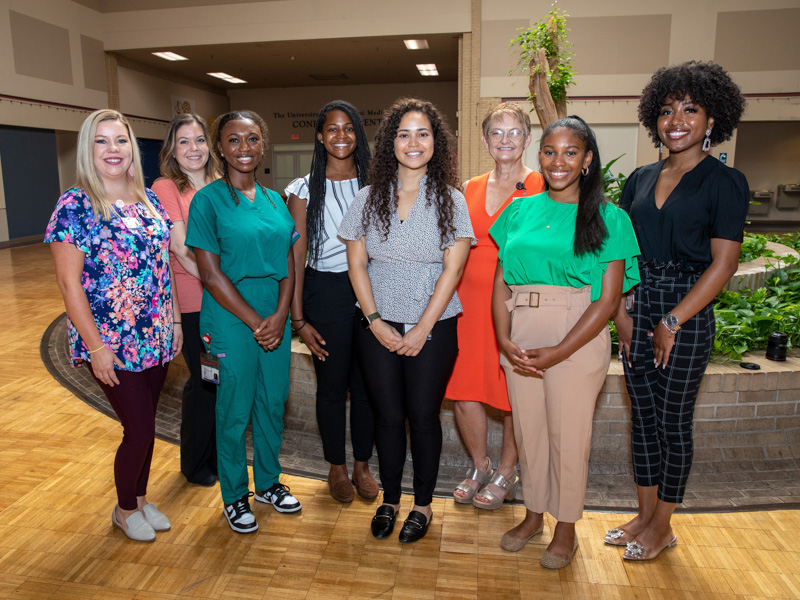
“For many, death and suffering push them away,” Mondy said. “For me, death and suffering provide a sense of hope and need for growth and discovery. I believe that’s what draws me to oncology.”
It drew her and her four fellow medical students to the Oncology Summer Internship, a paid, four-week program that ended Friday at UMMC.
It was a chance for them to observe around 20 oncology professionals treating their patients, to learn from national oncology experts virtually, and to mingle during social events.
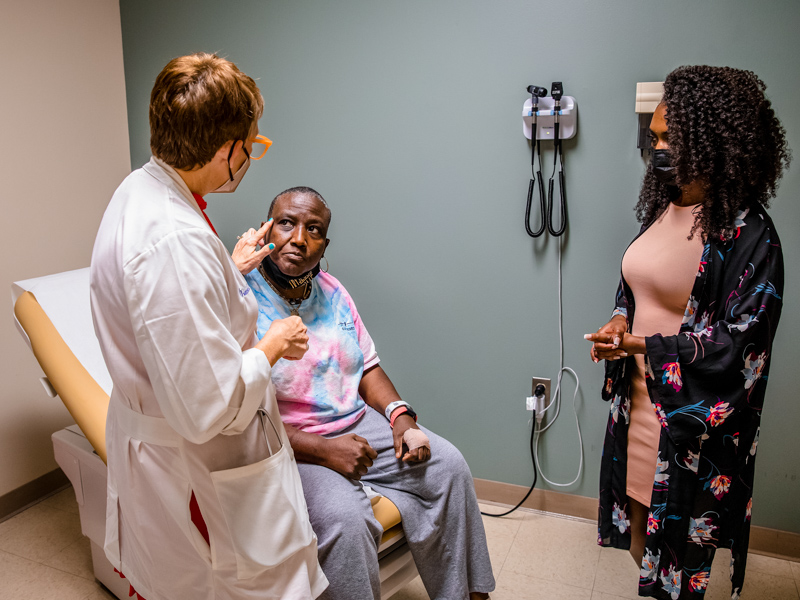
“It’s a way, early on in the students’ careers, to open their eyes to what oncology is and spark some interest,” said Dr. Stephanie Elkins, professor of medicine and medical director of the Division of Hematology/Oncology at UMMC.
Apparently, the interest for these UMMC students is more than a spark; more like a long-burning flame.
For Beamon, the beginning came when she was in high school in Camden. “I watched my once jubilant Grandma Mattie rapidly decline from advanced bladder cancer,” she said. “The time from her initial diagnosis to her passing felt like the shortest year of my life.”
Like her four peers, she competed for one of the internship spots reserved for rising second-year medical students from populations underrepresented in medicine. The American Society of Clinical Oncology, the program sponsor, selected UMMC as one of its host sites.
“This seemed to be a perfect fit for us,” said Elkins, who brought it to the attention of Dr. Loretta Jackson-Williams. “I was so glad that I could get Dr. Jackson to agree to support it from the student side.”
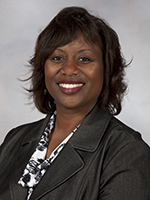
Jackson-Williams, professor of emergency medicine and UMMC School of Medicine vice dean for medical education, said Elkins is “the reason for this program.” It’s an “immersive experience,” she said, and a rare chance for students early in their training to observe, one-on-one, physicians treating patients in the clinics.
“It connects them with concepts they’re learning in the preclinical program, and with faculty who can serve as mentors. It’s wonderful for the students, each of whom had a personal reason for wanting to be involved in the program.”
For Ashby, a Tupelo native, it was “seeing the emotional toll cancer has had on my loved ones. At age 16, my mother lost her mother to cancer, and I believe that the loss of her mother still affects her tremendously.”
For Mondy, as she grew up in Clinton, it was seeing brain cancer consume her first cousin and “childhood pal,” diagnosed at age 10.
“Terri’s head full of curly black locks turned into a few strands on the floor,” Mondy said. “And eventually her fragile breaths turned into a distant memory.
“For the first time, cancer didn’t seem like this far-off disease that only plagued my family’s old folk; it was something that threatened the life of everyone, threatened the life of innocent people like Terri, of people like me.”
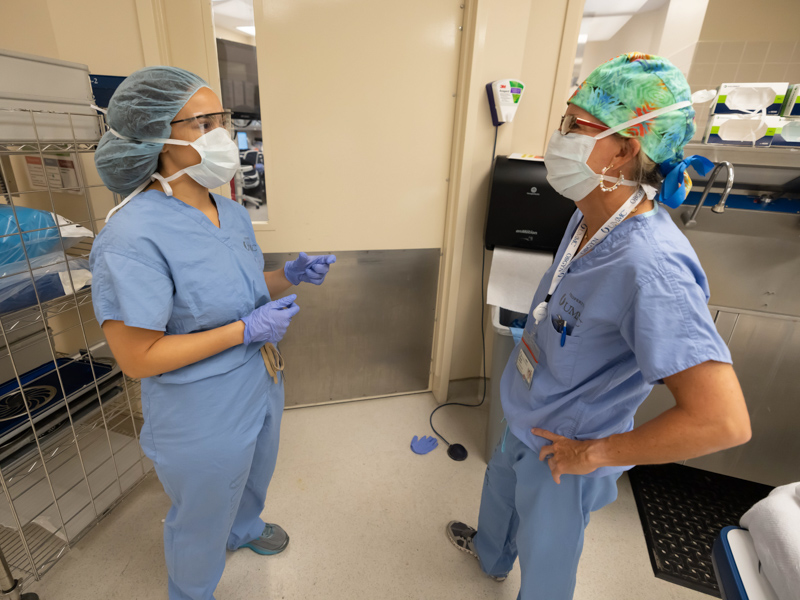
For McKenzie, brought up in Collinsville, it was a childhood disease – chicken pox – which spurred her on to medical school, as did her encounter with the people who treated her.
“I can recapture having rotten baby teeth from medications, having a permanent scar on my neck from surgery, or crying from not being able to play with other children due to the risk of worsening my illness,” she said.
“The health care staff at Riley Hospital in Meridian showed kindness and generosity towards my family.”
Oncology drew her in later, when her grandmother’s health suffered. “She was diagnosed with breast cancer around Thanksgiving 2011,” McKenzie said.
“By February 2012, cancer metastasized throughout her body. The physicians were able to keep her comfortable, but she died later that month. That sparked my interest in learning more about cancer.”
Later, after studying public health in college, her understanding of her grandmother’s tragedy deepened. “I realized that she had a lack of access to health care, lack of knowledge about regular breast cancer screenings and a fear of doctors,” she said.
“I always wished that I would have known more, so that I could better prepare my family.”
As for Martin, her family was not prepared for the fate of Camika Buckhalter two years ago. “My mom passed from acute myeloid leukemia,” said Martin, who grew up in Jackson. “She was 42.” Earlier this summer, Martin’s stepmom died of lung cancer.
“When my mom passed, it caught my whole family off-guard,” Martin said. “That was the push; I wanted to know more about the different types of cancer.”
When Martin was 11, her uncle died, but not from cancer. He was a homicide victim. Her mom allowed her to read the autopsy report; this helped kindle young Daja’s interest in pathology.
“I thought it was interesting to see what things stop us from living,” Martin said. Her uncle stopped living at age 27; it was the first time she faced the death of a relative so young.
“I can give you a lot of sad stories,” Martin said.
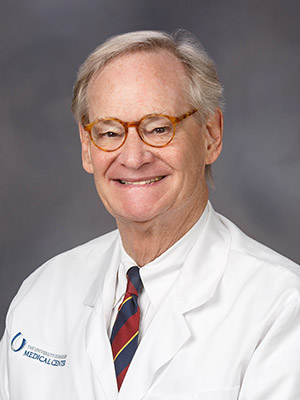
Dr. Keith Mansel hears many of those as professor of medicine and director of palliative and supportive care services. “It can be a heart-wrenching story,” said Mansel, one of the physicians Martin shadowed while he listened to patients’ stories.
“Daja’s bright, inquisitive, empathic; she asked such questions as ‘how do we tell people they are dying?’” Mansel said. “We talked about why it’s so hard to do that. Why physicians aren’t trained in doing that in a deep way.”
Physicians bring good news, too. Dr. Mildred Ridgway, associate professor of obstetrics and gynecology, does her part in that regard. During a shadowing session, McKenzie, the student whose grandmother died of breast cancer, entered an OR for the first time, in Wiser Hospital, and saw Ridgway at work.
“I absolutely wanted to show enthusiastic young medical students what we do,” said Ridgway, one of only a half dozen physicians in Mississippi practicing gynecologic oncology, a surgical subspecialty. In 2005, she became the first physician in Mississippi to do robotic surgery for a gynecological procedure; in late June, McKenzie observed another one as Ridgway oversaw the removal of a uterus riddled with cancer.
As Ob-gyn resident, Dr. Neil Huben, worked on the patient at the OR table, Ridgway directed from the nearby robot’s console, pointing out an ovary and the fallopian tube on an overhead monitor.
Afterward, McKenzie described the experience as one who had been learning medicine mostly through books and Power Point. “To actually see a uterus coming out of someone is very cool,” she said. “It went by so fast. I’m so glad I had this opportunity.”
It was an opportunity the surgeon herself did not have until late in her medical school education. “When you were in your third year, during clinical,” Ridgway said, “seeing something like this is the most exciting thing you’ve ever done in your life.”


